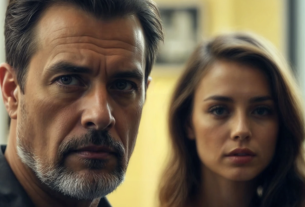“I’ve decided I’ll go to my mom’s on Saturday. For about three months, probably.”
The words dropped onto the table between a plate of fried potatoes and a salad. They fell lightly, matter-of-factly, like bread crumbs. Artyom said them without looking up from his food, carefully spearing a golden piece of chicken with his fork. For him, this was a done deal, not up for discussion. Just a fact, announced at dinner. He didn’t even look up, confident he’d hear, as always, the usual tired “okay” or, at worst, a couple of ritual sighs.
But there was nothing in response. Only the sound of his own chewing suddenly became deafeningly loud. He looked up. Kira wasn’t moving. Her fork lay on the table next to her plate, which she hadn’t touched again. She wasn’t looking at him. Her gaze was directed somewhere at the wall, but it was clear she didn’t see the faded wallpaper or the kitchen clock. She was staring into a void that had just opened up right in the middle of their kitchen. Her face was utterly calm, almost lifeless, and that scared Artyom more than any outburst could.
“Aren’t you going to say anything?” he asked, now with a hint of irritation in his voice. The silence was a challenge. “She needs her fence fixed, the veranda roof redone. She can’t handle it alone.”
He spoke confidently, listing weighty, manly tasks that, in his mind, could not be compared to their city life. It was his armor, his undeniable trump card, which he was playing for the third time in two years of marriage. Three months then, two and a half last year, and now another three. In total—almost a year spent apart. A year given to the fence and the roof.
Kira slowly turned her head toward him. She looked at him for a long, studying moment, as if seeing him for the first time. Not as her husband, but as a stranger who had accidentally sat at her table. There was no hurt or anger in her eyes. Only cold, detached curiosity.
“Artyom,” she said quietly, but her voice sounded clear and weighty in the frozen air. “The faucet in our kitchen has been leaking for a month. Remember? I told you three times. It drips. Drip-drip. Especially at night, you can hear it well.”
He blinked in confusion. The faucet? What does the faucet have to do with anything?
“Well, I’d call a plumber, since the husband can’t get around to it,” he mumbled, feeling his confidence beginning to crack.
“I don’t need a plumber, Artyom. I need a husband. Here. In this house. I got married—I didn’t sign up for some ‘wives of sailors’ club, waiting months for their captains to return from sea. Except your voyage is always in the same direction.”
He began to get irritated. The conversation was not going according to his script. She dared to contradict him, to compare his sacred filial duty to some dripping faucet.
“You don’t understand! It’s my mother! Who will help her if not me? She has no one but me! She’s a woman, she can’t fix the roof herself!”
This was his main, final argument. Ironclad. Unbreakable. It had always worked.
Kira gave a crooked smile, but the smile didn’t reach her eyes.
“You’re right. Your mother needs help. That’s sacred.”
Artyom exhaled in relief. Finally! She gets it! Now she’ll sigh and start packing his socks for the trip. But Kira continued, and her voice grew even firmer and colder, like ice.
“So let’s do this. Finish your dinner, pack your things, and go to her. Help with the fence, the roof, the garden, whatever she needs. And stay there. Because if you choose to be a son instead of a husband, I won’t stand in your way. Consider yourself a free man. I’ll text you the address of the court. File for divorce once you’re done with the fence.”
For a moment, Artyom thought he misheard her. That this was some kind of bad, inappropriate joke, triggered by a bad mood or a “female migraine.” He even tried to laugh it off, but the sound got stuck in his throat, coming out as a strange, hoarse spasm. He set his fork on the table. His appetite vanished, leaving a metallic taste in his mouth.
“Kira, what’s wrong with you? Are you serious? Divorce? Have you lost your mind? Just because I’m going to help my mother?”
He tried to make his voice condescending, as if talking to a child throwing a tantrum over nothing. But Kira’s calm, unmoving pose and her steady, unblinking gaze destroyed his defensive shell. She wasn’t playing. She wasn’t bluffing.
“I’m completely sane, Artyom. Probably for the first time in two years. This isn’t because you’re going. It’s because you’re staying there. In your mind, physically—it doesn’t matter. You’re not here. You’re not with me. Your life is there, at your mom’s place, with her fence and her roof. Here, you only stay overnight between your filial exploits.”
He jumped up from the table. The tiny kitchen suddenly felt cramped, filled with his outrage. He started pacing from the fridge to the window, waving his arms as if swatting away her words like pesky flies.
“What are you talking about? What other life? I work two jobs so we can live well! To pay for this apartment! I’m not going out with buddies or heading to a resort! I’m going to work! To help the only family I have, who raised me! And you! You sit here in warmth and comfort and dare to reproach me! You just don’t get what duty is!”
He unleashed everything he had saved for such occasions: his exhaustion, his work, his sacred duty. It was his shield, his tried-and-true weapon that always made her go quiet and feel guilty. But today it backfired.
Kira didn’t even flinch. She continued sitting at the table, her stillness more eloquent than all his frantic pacing.
“I understand everything, Artyom. I understand your mother is your mother. I’m not asking you to choose. You made your choice long ago, you just didn’t want to admit it. And I’m tired of pretending I don’t see it. I’m tired of coming second to roofing sheets and fence boards.”
“What are you saying, Kira? Can’t you stop—”
“If you’re going to your mother for three months, maybe we should just get divorced? Because I’m tired of you spending most of your time at her place!”
His face twisted. He stopped and stared at her, and his gaze now held not just anger, but genuine, childlike confusion. He really didn’t understand. In his world, he was a hero, a knight torn between duty and home. And she, the ungrateful one, didn’t appreciate it. He realized his arguments weren’t working. He’d hit a dead end, and at that dead end, there was always one way out, one saving call.
He spun around, grabbed his phone from the windowsill, and, turning away, dialed. He spoke quietly, but in the tense silence of the kitchen, every word was as loud as if shouted through a megaphone.
“Hi, Mom. Yeah, everything’s fine… almost. Listen, here’s the thing… Kira’s throwing a fit. Yeah, about the trip. Can you imagine? She says if I go, we’re getting divorced… No, I’m not joking, she’s dead serious… Says I’m choosing you over her… I don’t know what’s gotten into her! Out of nowhere! Yeah… Yeah, I think so too. Okay, Mom. See you.”
He hung up and put the phone on the table with the air of someone announcing checkmate. He looked at Kira again. There was no confusion in his eyes now. Now there was cold, borrowed confidence. He was no longer alone in this fight. He had called for reinforcements. Heavy artillery.
They didn’t have to wait long. Maybe twenty minutes, half an hour. This time wasn’t filled with ringing silence or awkward pauses. Artyom, now re-energized, demonstratively poured himself some tea, set the kettle down loudly, and sat in his seat, showing that life goes on and that petty female whims are just a nuisance. He no longer looked at Kira. He stared at his phone, reviewing diagrams, as if already planning repairs for his mom’s roof. He was in his element, the world of men’s work and tangible tasks, where her petty complaints had no access.
Kira didn’t move from her spot. She didn’t touch her cold dinner, didn’t get up to clear the table. She just sat, straight as a string, turning into a silent part of the furniture. Her calm had become something active, aggressive. It was the calm of someone who’s made a decision and is now just watching the chaos of those trying to change the inevitable.
The doorbell rang—short and commanding. Not a question, but a statement. Artyom jumped up, as if on cue, and rushed to open it. Valentina Pavlovna stood on the threshold. She didn’t look like a helpless old woman in need of help. Tall, stately, with tightly pressed lips and a sharp, appraising gaze, she entered the apartment not as a guest, but as an inspector come for an audit. She silently took off her good coat, hung it up, and, without glancing at Kira, went straight to the kitchen. Her bag—a large leather one, almost a doctor’s satchel—landed with a thud on a stool. The territory was claimed.
“Well, tell me, son, what’s happened here? I was visiting Elena Petrovna, thought I’d go home with you tomorrow, but now this…” she said, addressing only Artyom, as if Kira were invisible.
Artyom, finally supported, spoke up. He shared his version of events, where he was the victim and Kira the selfish, ungrateful woman who didn’t understand basic human values. He talked about duty, about helping, about the sacredness of a mother.
Valentina Pavlovna listened, slowly nodding. Then she turned to Kira. Her gaze was cold, like a surgeon before an operation.
“I always told Artyom that a family must be built on respect, Kira. Respect for parents, for obligations. A man is defined not by sitting on a couch, but by caring for his loved ones. All of them. And a wife should support him, not be a millstone around his neck.”
Kira was silent. She looked at the two of them—her husband, seeking approval in his mother’s eyes, and his mother, ready to protect her son from the world, including from his own wife. They were a single unit, a monolith from which she, Kira, was just a spare, chipped-off piece.
“Mom, I explained everything!” Artyom jumped in, feeling completely right. “That it’s not a whim, it’s necessary! The faucet can wait, but a leaky roof can’t! But she won’t listen!”
“That always happens when someone only thinks of themselves,” Valentina Pavlovna sighed sympathetically, again looking at Kira. “When comfort is all that matters. Your husband is not going on vacation, he’s going to work for the well-being of your future too. And you’re putting obstacles in his way.”
The pressure mounted. They spoke in turn, supporting each other, forming a tight circle of accusations. They didn’t shout. They spoke calmly, with righteous condemnation in their voices, which was much worse than yelling. They tried to grind her into the ground, to make her feel small, guilty, wrong. And in that moment, Kira looked up. She didn’t look at her mother-in-law. She looked straight at Artyom, at her husband, who was now standing beside another woman, destroying their marriage in perfect harmony.
“I’ve already said it: you leave, we divorce. What’s unclear?”
She didn’t say it as a question or a threat. It was a statement. An irrevocable verdict, no longer up for discussion.
Valentina Pavlovna’s face hardened. Her lips turned into a thin, angry line.
“So that’s how it is…” she hissed. “Ultimatums. You’re going to set terms for my son?”
“You hear that, Mom?” Artyom called out with a bitter smile. “That’s her gratitude for everything I do! She just wants to get rid of me and my responsibilities to you!”
“So that’s what you’ve decided?” Artyom stepped closer, his face reddened by a mix of hurt and righteous anger. “The minute something isn’t your way, it’s divorce? Think you’re scaring me?”
Valentina Pavlovna stepped up too, shoulder to shoulder with her son. Their united front was almost palpable. “Your husband’s father and I were married forty years, been through everything. But never did a woman tell a man whether he could go to his mother or not… Such a disgrace never happened. He’s going to his own home, not to strangers, to the house you took him from!”
They waited for a response. For arguments, justifications, shouting. They were ready for a long siege, for a night of lectures and accusations, after which a broken Kira, as always, would give in and start packing his suitcase. They were confident in their strength, in their rightness, in the inviolability of their “mother and son” alliance.
But Kira didn’t answer. She didn’t start an argument. Instead, she slowly, without a single unnecessary movement, got up from the table. Her face showed no anger or despair. Only a kind of empty, burnt-out concentration. She quietly walked around them, standing in the middle of the kitchen, and left for the hallway.
“See, Mom, she ran off!” Artyom whispered triumphantly. “She’s got nothing to say!”
Valentina Pavlovna just snorted contemptuously, certain the enemy had retreated to the bedroom—to cry and feel sorry for herself.
A minute later, Kira returned. In her hands she carried Artyom’s large travel bag. Not the one for the rare business trips, but the old, battered one—the very one he always took on his long trips to his mother’s. She placed it in the middle of the kitchen, unzipped it. The loud, dry sound made Artyom and his mother fall silent.
Kira left again and returned, holding a pile of clothes. She didn’t rummage through the closet, didn’t empty drawers. She took exactly what was on a separate shelf, packed by her for “mom’s needs.” She tossed in his old work pants with faded knees, a thick wool sweater he only wore there, a couple of washed-out T-shirts. She did it methodically, without fuss, like a nurse preparing instruments for surgery. Her movements were precise and deliberate.
“What are you doing?” Artyom’s voice trembled, all confidence gone.
Kira didn’t answer. She went to the hall and came back with his heavy hiking boots, still caked with last year’s mud. She carelessly tossed them on top of the sweater in the bag. Each gesture was a blow, far more painful than any word. She wasn’t throwing his things out. She was preparing him for a trip. The very trip from which, for her, he would not return.
“Stop this nonsense!” Valentina Pavlovna exclaimed, realizing the situation was slipping out of control. “Kira, I’m telling you, stop it right now!”
But Kira seemed deaf. She zipped up the bag. Then she went to the key rack by the kitchen entrance. Two sets of keys hung there—hers and his. She took his. The metallic jingle in the quiet sounded like a sentence. Artyom stared at his keys in her hand, and finally, it started to sink in. This was not a bluff. This was not a performance. This was an execution.
She approached the bag, calmly unzipped the side pocket, took out the second set of house keys, and zipped it back up. That was it. The final touch.
Picking up the heavy bag, without bending, she carried it to the front door. She unlocked it, opened the door wide, and set the bag out onto the landing. Then she turned around. She didn’t look at her husband, but at both of them standing there, bewildered, their self-assurance gone, stunned by her cold, methodical resolve. Her gaze was calm.
“Well, now you’re ready,” she said, her voice even, devoid of any emotion. “You can go. Your mom is waiting.”
And she closed the door. She didn’t slam it, didn’t lock every bolt. She just closed it, cutting them off from her life. The click of the lock was quiet, almost mundane. But for Artyom and Valentina Pavlovna, left standing in the dim stairwell next to the forlorn travel bag, it sounded louder than any explosion. They’d won. He was free to go to his mom. Only, he no longer had a home…



